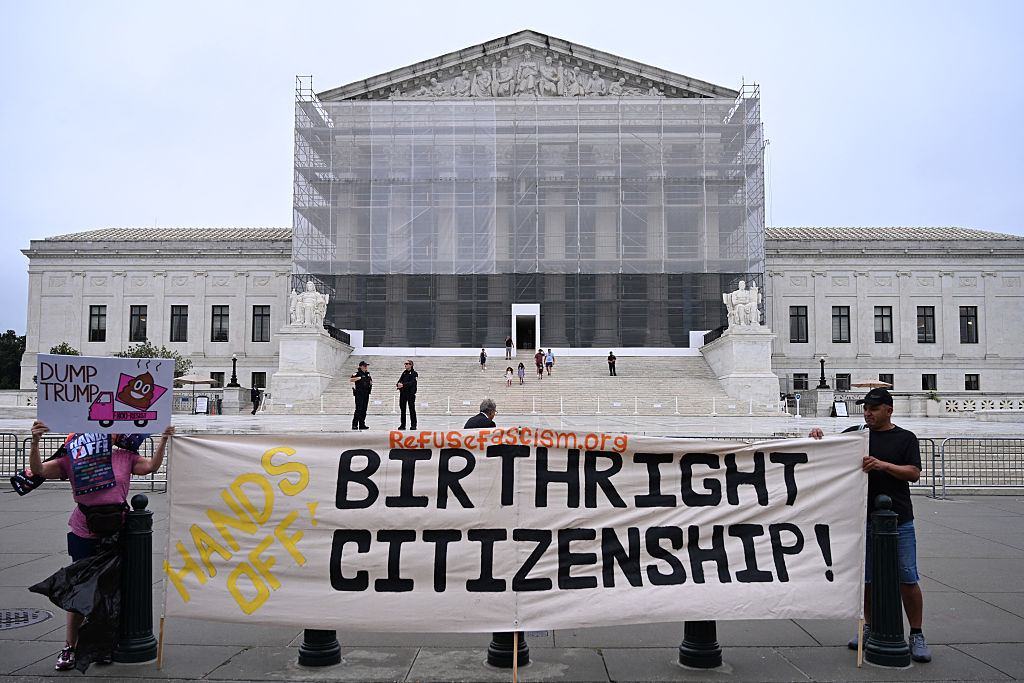

A federal appeals court docket dominated Wednesday that President Donald Trump’s govt order to limit birthright citizenship is unconstitutional.
CBS Information reported that the newest resolution from a three-judge panel of the ninth U.S. Circuit Court docket of Appeals follows months of authorized challenges to the Trump administration’s try to finish birthright citizenship for youngsters born on U.S. soil to undocumented mother and father via govt motion.
How did the ninth Circuit judges rule of their resolution?
“We conclude that the Govt Order is invalid as a result of it contradicts the plain language of the Fourteenth Modification’s grant of citizenship to ‘all individuals born in the US and topic to the jurisdiction thereof,’” the judges wrote in Wednesday’s ruling.
This marks the primary time an appellate court docket has dominated on the deserves of Trump’s coverage and its adherence to the 14th Modification of the Structure. The court docket upheld a June ruling by U.S. District Choose John C. Coughenour, a President Ronald Reagan appointee in Seattle, which blocked the order and located that the administration’s effort to finish birthright citizenship was pushed by political motives, per CBS Information.
The two-1 ruling was written by Choose Ronald Gould, appointed by President Clinton, and joined by Choose Michael Daly Hawkins, appointed by President Obama, and Choose Patrick Bumatay, a Trump appointee. In June, Blavity reported that the Supreme Court docket’s 6-3 ruling despatched the birthright citizenship situation again to the decrease courts, however blocked federal judges from granting a nationwide injunction on Trump’s insurance policies.
The Appellate justices discovered one authorized avenue for a nationwide injunction
In response to that call, the ninth Circuit judges decided that just one authorized avenue remained unaddressed by the justices, permitting them to rule in favor of a number of states, together with Washington, Arizona, Illinois, and Oregon. The states argued {that a} nationwide order was needed to stop issues through which birthright citizenship would apply solely in components of the nation, per the Related Press.
“We conclude that the district court docket didn’t abuse its discretion in issuing a common injunction in an effort to give the States full reduction,” Hawkins and Gould wrote.
Bumatay dissented partially, arguing the states lacked authorized rights or standing to sue: “We should always method any request for common reduction with good religion skepticism, aware that the invocation of ‘full reduction’ isn’t a backdoor to common injunctions,” he wrote.
What does the 14th Modification say about birthright citizenship?
In line with the 14th Modification, birthright citizenship refers to “All individuals born or naturalized in the US, and topic to the jurisdiction thereof, are residents of the US and of the State whereby they reside.” The states additionally cited the US v. Wong Kim Ark, 169 U.S. 649 (1898) case, through which the Supreme Court docket dominated that Wong Kim Ark, born in San Francisco, was thought-about a U.S. citizen regardless of his mother and father being undocumented.
Trump signed his govt order to finish birthright citizenship in January, which was one among greater than a dozen orders he signed initially of his second time period. He argued that youngsters born on U.S. soil to undocumented mother and father mustn’t routinely turn into Americans.
White Home spokeswoman Abigail Jackson spoke out concerning the ninth Circuit’s ruling to Newsweek: “The Ninth Circuit misinterpreted the aim and the textual content of the 14th Modification. We look ahead to being vindicated on enchantment.”














